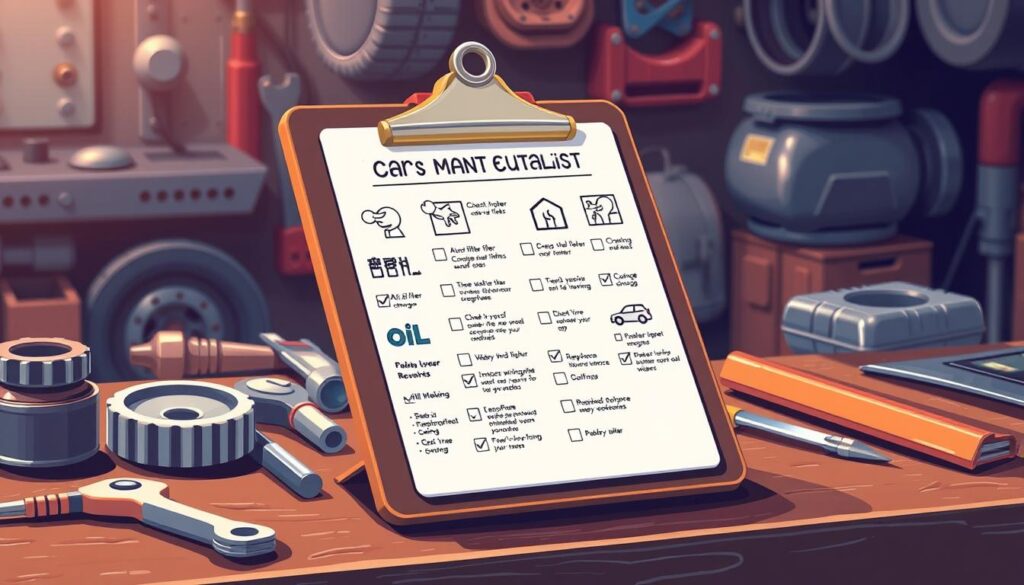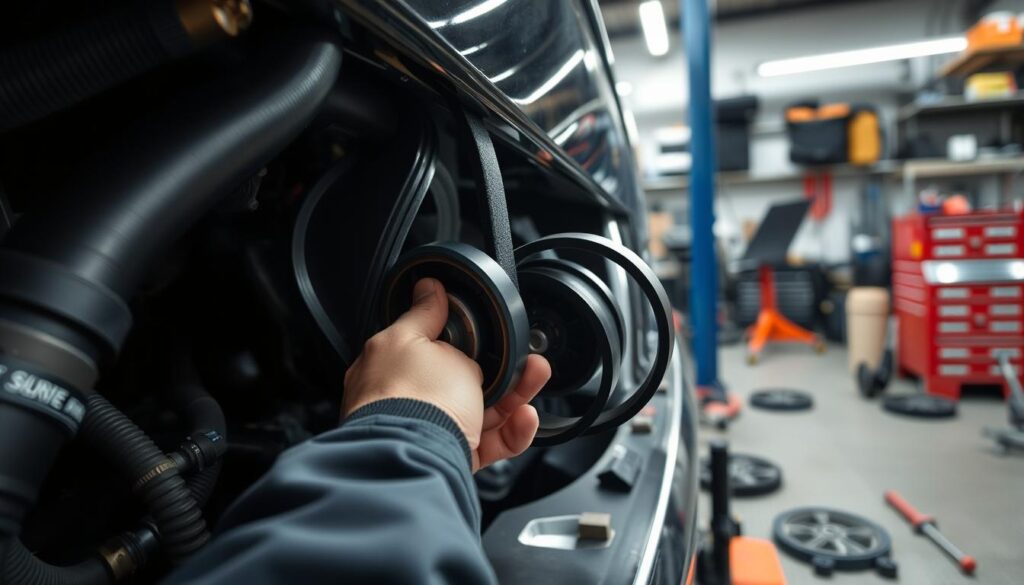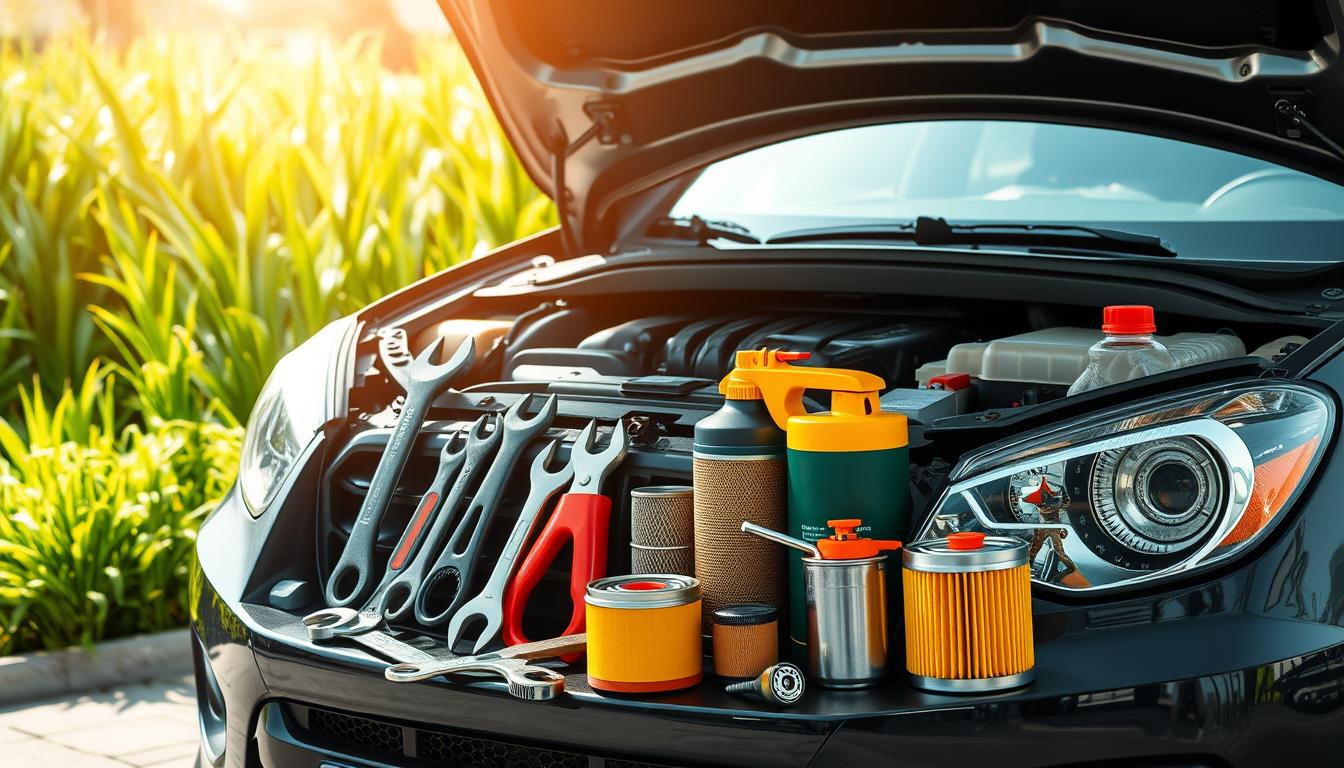Did you know that regular car maintenance can extend your vehicle’s lifespan by up to 15 years? This remarkable statistic underscores the importance of staying proactive with your auto care strategies. By incorporating essential car maintenance tips into your routine, you not only improve your vehicle’s performance but also increase its safety and reliability. Regular inspections and upkeep can save you money on costly repairs down the line, making it crucial for every car owner to understand these practices. This article offers actionable vehicle maintenance advice and auto care suggestions to help you ensure your automobile remains in top shape for years to come. For a deeper dive into important maintenance tips, visit this detailed guide.
Key Takeaways
- Understanding your owner’s manual is crucial for proper maintenance.
- Regular washing and waxing protect your vehicle’s finish.
- Monitoring fluid levels can prevent significant engine damage.
- Inspecting tires helps maintain safe driving conditions.
- A clean battery and regular strength tests prolong its life.
- Regular oil changes enhance engine efficiency and longevity.
- Ignoring warning lights can lead to serious issues.
Understand Your Owner’s Manual
Your owner’s manual is an indispensable resource for vehicle maintenance. It is a comprehensive guide, meticulously crafted for your specific vehicle. By delving into its pages, you unlock a wealth of knowledge, tailored to the unique requirements of your automobile.
Familiarize Yourself with Key Guidelines
The manual is replete with critical information for your vehicle’s upkeep. It elucidates the operation of various functionalities and alerts you to potential hazards. Mastery of these details empowers you to drive and maintain your vehicle with greater proficiency.
Know the Recommended Maintenance Schedule
The maintenance checklist within the manual is a treasure trove of information. It outlines a schedule of essential services, including oil changes, brake inspections, and fluid level checks. Adherence to this schedule is paramount in averting major malfunctions and ensuring your vehicle’s longevity.
Keep Your Car Clean
Adherence to rigorous car upkeep protocols is paramount for preserving vehicular longevity and performance. Adherence to these guidelines can substantially prolong your vehicle’s lifespan while maintaining its visual allure. The removal of dirt, grime, and other detrimental substances through regular cleaning is imperative. This action prevents corrosion, thereby constituting a critical component of auto care recommendations.
Wash Your Vehicle Regularly
Efforts to maintain vehicular freshness necessitate bi-weekly washing. Such frequency is especially critical in adverse weather conditions or when traversing salt-treated roads. Regular washing serves to eradicate contaminants that could irreparably harm your vehicle’s exterior. This simple yet time-consuming endeavor not only elevates your car’s visual appeal but also underpins its overall health. For further guidance, refer to this informative resource on car care tips.
Wax for Extra Protection
Application of wax to your vehicle every few months instills an additional barrier against environmental degradation. This practice not only safeguards the paint but also augments the vehicle’s luster. Incorporating waxing into your routine is a prudent auto care strategy that fortifies your investment against environmental factors. A meticulously maintained exterior significantly influences resale value, rendering waxing a valuable addition to your car upkeep regimen.
Check Your Fluids
Engaging in the regular examination of your vehicle’s fluids is paramount for adept car maintenance. Adequate fluid levels are indispensable for the seamless operation and optimal efficiency of your automobile. Failure to adhere to this critical maintenance routine can precipitate severe engine malfunctions. It is imperative to monitor the following fluids:
Engine Oil
Engine oil acts as a lubricant, mitigating friction and averting overheating within the engine. It is advisable to inspect your oil levels at least monthly, verifying its cleanliness and conformity to the recommended level. Inadequate or contaminated oil can significantly impair engine performance, underscoring its importance in car upkeep.
Brake Fluid
Brake fluid is indispensable for the efficacious operation of your vehicle’s brakes. A decrease in brake fluid levels may signify a leak, necessitating prompt attention. Maintaining the fluid at the correct level is crucial for road safety and contributes to effective vehicle maintenance.
Transmission Fluid
Transmission fluid is responsible for lubricating the transmission’s components. Regular inspections of this fluid are essential for preserving optimal performance and averting issues that could compromise your driving experience. Vigilance regarding any alterations in fluid color or level is advisable, as these may indicate underlying problems.
Coolant Levels
Coolant is vital in preventing engine overheating during operation. It is crucial to maintain appropriate coolant levels, especially in extreme climatic conditions. Consistent monitoring of your coolant reservoir and replenishment as required is essential for maintaining your vehicle’s efficiency.
Inspect Your Tires
Tires are paramount for safe vehicular operation. Adopting regular inspections is a fundamental car maintenance best practice for all vehicle proprietors. Adherence to routine car maintenance advice significantly boosts both safety and performance.
Check Tire Pressure
Proper tire pressure is critical for optimal fuel efficiency and tire durability. Under-inflated tires can cause increased wear and diminish your vehicle’s handling capabilities. It is imperative to check tire pressure monthly and before embarking on long journeys to verify they meet the recommended levels.
Monitor Tread Depth
Monitoring tread depth is another critical aspect of tire maintenance. Adequate tread is essential for effective traction, particularly in wet conditions. A simple method to assess your tire’s tread is the penny test: insert a penny into the tread; if Lincoln’s head is visible, it may be time for a replacement.
Rotate Tires Regularly
Rotating your tires every 5,000 to 7,500 miles is crucial for even wear distribution. This practice extends tire lifespan, thereby enhancing vehicle safety. Adhering to these guidelines is a cornerstone of routine car maintenance advice, offering long-term savings in both time and financial resources.
Maintain Your Battery
A well-maintained battery is essential for your vehicle’s performance and longevity. Adherence to these automobile servicing tips ensures your battery operates optimally throughout its lifespan.
Clean Battery Terminals
Corrosion can impede electrical connectivity between your battery and vehicle. Regular cleaning of the battery terminals prevents buildup, ensuring efficient energy transfer. A mixture of baking soda and water effectively removes corrosion; however, be cautious to avoid spilling it onto surrounding components.
Test Battery Strength
Testing your battery’s strength is crucial, especially before the colder months. Cold weather can significantly impact battery performance. Utilizing a multimeter is an effective method to assess voltage levels. Batteries generally require replacement every three to five years, so proactive checking can help avoid unexpected breakdowns.
Incorporating these expert car care tips into your routine will maintain your battery in optimal condition. If professional assistance is needed, don’t hesitate to reach out for support here. Regular maintenance ensures a longer-lasting vehicle and minimizes roadside surprises.
Change Your Air Filter

The maintenance of a clean air filter is paramount for your vehicle’s operational efficacy. It guarantees the optimal flow of air for combustion, thereby enhancing fuel efficiency. Conversely, a soiled or obstructed air filter can drastically diminish your car’s mileage and precipitate increased engine wear. Adherence to a comprehensive maintenance checklist for cars necessitates regular assessments of the air filter’s condition.
Importance of Clean Air Flow
A pristine air filter is indispensable for the preservation of your engine’s integrity. It facilitates the adequate intake of air into the engine, a prerequisite for efficient combustion. Impeded air flow, however, can impede the engine’s performance, resulting in diminished power and efficiency. Moreover, the accumulation of dirt and contaminants within the engine can lead to its deterioration, underscoring the imperative of consistent air filter maintenance.
How Often to Replace
For peak performance, the air filter should undergo inspection and replacement every 12,000 to 15,000 miles. It is imperative to consult your owner’s manual for precise guidelines, as various vehicles may demand different maintenance schedules. Vigilance in this routine task significantly enhances your vehicle’s efficiency and longevity, embodying sound vehicle maintenance advice.
Pay Attention to Your Brakes
Maintaining your brakes is paramount for both safety and vehicle performance. Regular attention can significantly enhance your driving experience. Understanding the signs of worn brake pads is a key aspect of car maintenance best practices.
Signs of Worn Brake Pads
Several indicators signal that your brake pads may require immediate attention:
- Squeaking or grinding noises when braking
- Reduced braking efficiency
- Vibrations or pulsations when you apply the brake pedal
Importance of Regular Inspections
Frequent inspections are crucial for ensuring your safety on the road. They help identify potential issues early, which can save you from costly repairs later. It’s recommended to have your brakes checked at least once a year or more often if you frequently drive in heavy traffic or navigate hilly terrains. Implementing these tips for maintaining your car will keep your vehicle running smoothly.
Keep Your Lights in Check
Proper lighting is paramount for safe driving, especially during nighttime or inclement weather. Regular checks of all vehicle lights, including headlights, taillights, brake lights, and turn signals, are crucial for ensuring safety on the road. Incorporating these tasks into your routine car maintenance advice allows for proactive measures in identifying potential issues.
Ensure All Lights Are Functional
A comprehensive inspection of your car’s lights should occur frequently. Look for dimming lights or any that may have gone out entirely. Keeping a checklist can aid in confirming that every light functions correctly. It’s one of the essential auto care suggestions to follow for enhancing visibility and reducing the risk of accidents.
Replace Burnt-Out Bulbs Promptly
If you find any burnt-out bulbs, address the situation immediately. Delaying bulb replacements can lead to safety hazards and possibly traffic violations. Having spare bulbs on hand makes this task much more manageable. Not only does prompt replacement follow good auto care suggestions, it also ensures you maintain your vehicle’s overall functionality.
Monitor Belts and Hoses

Belts and hoses are pivotal to your vehicle’s functionality. It is imperative to monitor these components regularly to avert potential malfunctions. Adherence to car upkeep guidelines enables the early detection of wear signs.
Signs of Wear and Tear
Inspect belts and hoses for any visible damage that could impede performance. Be vigilant for:
- Cracks or fraying
- Leaks around hoses
- Unusual noises from the engine area
A failing serpentine belt can precipitate severe issues, including engine overheating or failure. Similarly, worn radiator hoses may result in coolant leaks, jeopardizing your vehicle’s structural integrity.
Regular Replacement Guidelines
Implementing timely replacements is a cornerstone of expert car care tips, ensuring your vehicle’s longevity. It is commonly recommended to replace serpentine belts every 60,000 to 100,000 miles. Adherence to these intervals can circumvent unexpected breakdowns and extend your vehicle’s lifespan.
Schedule Regular Oil Changes
Adherence to a regimen of oil changes is paramount for the upkeep of your vehicle. This practice ensures the engine operates with optimal efficiency and longevity. It not only mitigates engine wear but also significantly boosts fuel efficiency.
Find the Right Oil for Your Car
The selection of appropriate oil is critical for superior performance. Vehicles necessitate either conventional or synthetic oil, contingent upon the manufacturer’s directives. Consult your owner’s manual for precise recommendations, as the correct oil grade is pivotal for both efficiency and longevity. Adherence to this servicing tip guarantees your engine receives the requisite lubrication and protection.
Establish an Oil Change Routine
Implementing a consistent schedule for oil changes is instrumental in preserving your vehicle’s health. The consensus is to change oil every 5,000 to 7,500 miles. Adherence to this schedule forestalls potential engine malfunctions and prolongs your vehicle’s lifespan. Monitoring the interval since your last oil change serves as a dual-purpose reminder and proactive measure in your car maintenance regimen.
Don’t Ignore Warning Lights
Modern vehicles are equipped with a plethora of dashboard warning lights, acting as sentinels for potential system malfunctions. Mastery over these indicators is paramount for the implementation of efficacious car maintenance best practices. Each warning light conveys critical information regarding potential issues with your vehicle.
Understanding Dashboard Indicators
Before embarking on your journey, it is imperative to familiarize yourself with your vehicle’s dashboard indicators. A few common lights include:
- Check Engine – Signals engine problems.
- Oil Pressure – Indicates low oil levels or pressure.
- Battery – Points to charging system issues.
Upon noticing any warning lights, it is crucial to take them seriously. These alerts can signify issues ranging from minor to severe, necessitating immediate attention. For further insights, consult vehicle maintenance advice regarding the perils of ignoring warning lights.
When to Seek Professional Help
If a warning light persists or if you observe unusual sounds, performance issues, or smells, seeking professional assistance is imperative. Timely intervention in these warning signs can substantially mitigate the risk of further damage and ensure your vehicle’s continued operability. Vigilance towards dashboard alerts is a fundamental aspect of effective car maintenance best practices.
Plan for Seasonal Maintenance
Seasonal transformations exert a profound influence on vehicular performance. Anticipating these changes necessitates the preparation of your automobile for forthcoming climatic conditions. Adherence to routine maintenance protocols ensures vehicular safety and efficiency across the calendar year.
Winter Preparations
With the advent of winter, it is imperative to verify antifreeze levels. This critical fluid serves as a barrier against engine freezing, thereby guaranteeing optimal functionality in frigid temperatures. The transition to winter tires significantly enhances traction and improves vehicular maneuverability on icy and snowy terrains. Additional auto care recommendations encompass:
- Testing your battery to prevent unexpected failures in low temperatures.
- Inspecting windshield wipers and ensuring your defrost system is operational.
- Keeping an emergency kit in your vehicle for added safety during winter travels.
Summer Readiness
Upon the arrival of summer, a shift in focus towards vehicular cooling is paramount. The efficacy of the air conditioning system in enhancing driving comfort cannot be overstated. It is crucial to verify coolant levels to avert overheating. Valuable auto care suggestions include:
- Inspecting tires for proper inflation, as heat can increase tire pressure.
- Cleaning the radiator and ensuring it’s free of debris.
- Checking the battery, as high temperatures can shorten its lifespan.
For additional insights and comprehensive guidelines on vehicular care, refer to these auto care suggestions. Proactive measures towards seasonal maintenance enable the adaptation of your vehicle to climatic fluctuations, thereby ensuring a more seamless and secure driving experience throughout the year.
Keep a Maintenance Log
Adopting a meticulous log of your vehicle’s service history offers substantial benefits for car owners. By meticulously documenting your car’s maintenance, including repairs and oil changes, you compile a detailed account of its needs over time. This approach ensures a proactive stance towards your car’s upkeep, facilitated by a consistent maintenance checklist.
Track Your Vehicle’s History
Recording each service not only facilitates the tracking of necessary tasks but also significantly enhances your car’s resale value. The transparency provided by such records reassures potential buyers about your vehicle’s condition. This diligent approach to maintenance logging enables adherence to expert car care tips, preventing any critical tasks from being overlooked.
Benefits of Keeping Records
Beyond enhancing your vehicle’s value, a well-maintained maintenance log serves as a reliable reminder for upcoming maintenance tasks. This ensures that no aspect of care is overlooked. By adopting a structured approach to record keeping, you enhance your confidence in your car’s reliability. For further insights into effective planning techniques, refer to this guide on expert tips that can refine your maintenance skills.
